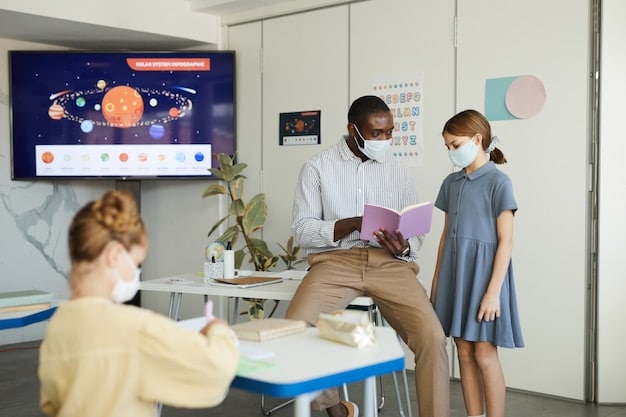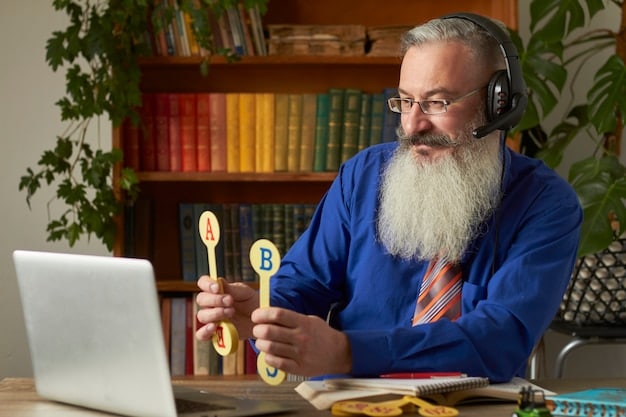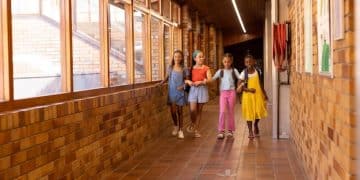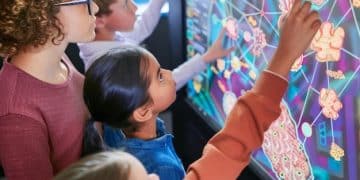Future of education: trends & innovations shaping tomorrow’s classroom

Anúncios
The future of education is being profoundly reshaped by burgeoning trends and innovations, moving beyond traditional models to embrace personalized learning, digital integration, and skill-based curricula driven by technological advances and changing societal needs.
Anúncios
The landscape of learning is constantly evolving, and understanding The Future of Education: Trends and Innovations Shaping the Classroom of Tomorrow is essential for anyone invested in preparing students for a rapidly changing world. This dynamic field promises exciting shifts in how knowledge is acquired, applied, and shared, moving beyond conventional boundaries.
The Digital Renaissance: Technology as a Core Enabler
The integration of technology into education is not a new concept, but its depth and breadth are undergoing a profound transformation. We are moving beyond simply using computers in classrooms to leveraging sophisticated digital platforms that fundamentally alter teaching and learning methodologies.
The digital renaissance in education is characterized by the pervasive use of tools that offer personalized, adaptive, and immersive learning experiences. This shift requires not only access to technology but also the pedagogical expertise to utilize it effectively.
Anúncios
Adaptive Learning Systems and AI
Adaptive learning systems, powered by artificial intelligence (AI), are at the forefront of this technological revolution. These systems analyze a student’s performance in real-time, identifying strengths and weaknesses, and then tailor the curriculum to meet individual needs. This personalized approach ensures that learning is efficient and engaging, addressing specific gaps while challenging advanced learners.
- Personalized pathways tailored to individual student pace and style.
- Real-time feedback and progress tracking for students and educators.
- Automated assessment and content recommendation, enhancing efficiency.
- Identification of learning gaps and targeted interventions for improved outcomes.
AI’s role extends beyond adaptive learning. It can automate administrative tasks, provide intelligent tutoring, and even generate hyper-personalized content, freeing educators to focus on more complex, high-value interactions with students. The goal is not to replace teachers but to augment their capabilities, enabling them to be more effective mentors and facilitators.
Virtual and Augmented Reality (VR/AR)
Virtual and Augmented Reality technologies are set to revolutionize how students engage with complex subjects. Imagine dissecting a virtual frog without harming an animal, exploring ancient civilizations in 3D, or conducting complex scientific experiments in a risk-free virtual laboratory. VR and AR offer immersive experiences that transcend the limitations of traditional textbooks and lectures.
These technologies provide experiential learning opportunities that foster deeper understanding and retention. They allow students to visualize abstract concepts and interact with virtual environments, making learning more memorable and impactful. The cost of these technologies is decreasing, making them increasingly accessible to educational institutions.
In essence, technology in education is evolving from a mere supplementary tool to an integral component of the learning process. It bridges geographical barriers, offers unparalleled access to resources, and cultivates a dynamic, interactive learning environment that prepares students for a future dominated by digital literacy.
Personalized Learning: Tailoring Education to the Individual
The traditional one-size-fits-all model of education is steadily giving way to personalized learning approaches. Recognizing that every student learns differently, at varying paces and with unique interests, educators are increasingly adopting strategies that cater to the individual.
This shift is driven by a deeper understanding of cognitive science and the availability of technological tools that make personalization feasible on a larger scale. The aim is to create environments where students feel understood, supported, and motivated to achieve their full potential.
Student-Centered Pedagogies
Personalized learning emphasizes student agency, allowing learners to have a greater say in what, when, and how they learn. This involves moving away from teacher-centric instruction towards methodologies where the student is actively involved in their educational journey.
- Designing curricula around student interests and learning styles.
- Providing choices in assignments, projects, and assessment methods.
- Fostering self-directed learning and inquiry-based approaches.
- Encouraging reflection and metacognition – learning about how one learns.
Project-based learning, inquiry-based learning, and competency-based education are prime examples of student-centered pedagogies that align well with personalized learning. These approaches encourage active exploration, critical thinking, and problem-solving, skills vital for the 21st century.

Flexible Learning Pathways
Personalized education also implies flexible learning pathways, where students are not confined to a rigid progression through grades or subjects. Instead, they can accelerate through topics they master quickly or spend more time on areas where they need additional support.
This flexibility can manifest in various ways, from individualized education plans (IEPs) for all students, not just those with special needs, to modular course structures where students can pick and choose based on their academic goals and career aspirations. Digital platforms play a crucial role here, facilitating tracking of progress and seamless transitions between different learning modules.
The ultimate goal of personalized learning is to ensure that education is relevant, engaging, and effective for every student. By recognizing and responding to individual differences, educators can foster a love for learning and equip students with the skills they need to thrive in a complex world.
Global and Interconnected Learning Environments
The future of education is inherently global, blurring geographical boundaries and fostering a sense of interconnectedness among learners worldwide. The advancements in communication technology have made it increasingly possible for students to collaborate with peers from different cultures and countries, enriching their perspectives and developing global competencies.
This global vision extends beyond mere technological connectivity; it encompasses a curriculum that reflects diverse viewpoints, promotes intercultural understanding, and prepares students to be responsible global citizens. Education is no longer confined to the four walls of a classroom.
Cross-Cultural Collaboration and Exchange
Online platforms facilitate real-time collaboration on projects between students in different parts of the world. This direct interaction not only enhances language skills but also cultivates empathy, respect for diversity, and an understanding of global issues.
Virtual exchange programs, once a niche concept, are becoming more common, allowing students to experience other cultures without the need for extensive travel. These programs can range from simple video conferencing sessions to complex collaborative research projects.
- Development of global communication and negotiation skills.
- Exposure to diverse perspectives and problem-solving approaches.
- Building an international network of peers and mentors.
- Increased cultural awareness and reduced ethnocentrism.
Beyond formal programs, educators are increasingly incorporating global themes and case studies into their lessons, ensuring that students understand the interconnectedness of our world and the impact of global events on local communities.
Access to Global Resources and Expertise
Technology democratizes access to educational resources and expertise that were once exclusive to privileged institutions. Students in remote areas can now access lectures from world-renowned professors, participate in online courses from prestigious universities, and utilize vast digital libraries.
Massive Open Online Courses (MOOCs) continue to evolve, offering specialized knowledge from leading experts across the globe. This accessibility levels the playing field, providing opportunities for lifelong learning and professional development regardless of location or economic status. The future classroom is less about physical walls and more about virtual inclusivity and boundless knowledge.
Skill-Based Education: Preparing for the Future Workforce
The traditional focus on rote memorization and content delivery is being supplanted by an emphasis on developing critical skills that are essential for success in the 21st-century workforce. As automation and AI reshape job markets, the demand for adaptable, innovative, and critically thinking individuals is skyrocketing.
Skill-based education is not just about vocational training; it’s about equipping all students with transferable competencies that enable them to navigate complex challenges, collaborate effectively, and continuously learn and adapt throughout their lives.
Emphasis on Soft Skills and Transdisciplinary Learning
While technical skills remain important, “soft skills” such as critical thinking, problem-solving, creativity, communication, and collaboration are increasingly recognized as paramount. These are the skills that machines cannot easily replicate, making humans uniquely valuable.
Education is moving towards transdisciplinary approaches, breaking down traditional subject silos. Students learn to apply knowledge from various disciplines to solve real-world problems, fostering holistic understanding and innovative solutions. This mirrors the complex and interconnected nature of modern professional challenges.
This approach often involves project-based learning where students work in teams to address authentic problems, developing both their content knowledge and their essential soft skills simultaneously. Feedback and reflection are integral to this process, allowing students to refine their abilities.
Competency-Based Education (CBE)
Competency-Based Education (CBE) is a framework that directly aligns with skill-based learning. Instead of progressing based on seat time or age, students advance once they demonstrate mastery of specific competencies, regardless of how long it takes them to achieve that mastery. This contrasts sharply with traditional time-based models.
- Focus on demonstrated mastery of skills, not just content coverage.
- Flexible pacing allows students to learn at their optimal speed.
- Clear learning objectives and performance indicators.
- Potential for accelerated learning for advanced students and personalized support for those needing more time.
CBE requires robust assessment methods that genuinely measure skill acquisition rather than just recall. Portfolios, performance tasks, and authentic assessments are key components. This shift empowers students to take ownership of their learning journey and ensures they leave with measurable, workplace-ready competencies.
Lifelong Learning and Micro-credentials
The notion of education as a finite period in one’s life, typically confined to formative years, is rapidly becoming obsolete. In a world characterized by unprecedented change, continuous learning, or “lifelong learning,” is no longer a luxury but a necessity for personal and professional relevance.
This paradigm shift is driven by the rapid pace of technological innovation, which constantly renders existing knowledge and skills outdated, and by longer career spans that require individuals to adapt to multiple professional transitions. The future of education is a continuous journey.
Formal and Informal Learning Integration
Lifelong learning encompasses both formal educational programs and a vast array of informal learning opportunities. The boundaries between these are blurring, with individuals learning through online courses, professional development workshops, mentorships, personal projects, and even social media.
Educational institutions are adapting by offering more flexible, modular programs that cater to adult learners and those seeking to upskill or reskill. This includes micro-credentials, bootcamps, and short courses designed to address specific skill gaps quickly and efficiently. The goal is to provide accessible, relevant, and timely learning opportunities.

The Rise of Micro-credentials and Digital Badges
Micro-credentials and digital badges are emerging as a powerful currency in the lifelong learning ecosystem. These are verifiable certifications that validate mastery of a specific skill or a small cluster of competencies, often acquired through short, focused learning experiences.
- Portable and shareable digital proof of specific skills.
- Recognized by employers as evidence of targeted expertise.
- Offers flexible and affordable pathways to professional development.
- Complements traditional degrees by showcasing specialized competencies.
Unlike traditional degrees, which attest to a comprehensive body of knowledge, micro-credentials allow individuals to showcase highly granular skills relevant to specific job roles or industry demands. They provide a precise and agile way for individuals to demonstrate their evolving competencies to potential employers, fostering continuous employability in dynamic job markets.
Well-being and Holistic Development in Education
While academic achievement remains a core goal, the future of education places a significantly stronger emphasis on the holistic development and well-being of students. Recognizing that mental health, emotional intelligence, and social skills are foundational to both academic success and life satisfaction, educational institutions are integrating these aspects into their core mission.
This shift reflects a growing understanding that education is not merely about accumulating facts but about nurturing resilient, empathetic, and well-rounded individuals capable of thriving in complex social and professional landscapes.
Social-Emotional Learning (SEL) Curricula
Social-Emotional Learning (SEL) programs are becoming an integral part of the curriculum, teaching students self-awareness, self-management, social awareness, relationship skills, and responsible decision-making. These competencies are crucial for navigating personal challenges, building positive relationships, and contributing constructively to society.
SEL is not an add-on but is woven into the daily fabric of school life, from classroom interactions to extracurricular activities. Educators are being trained to foster emotional literacy and create supportive environments where students feel safe to express themselves and learn from their experiences.
This emphasis on emotional intelligence prepares students not only for personal well-being but also for the collaborative and interpersonal demands of future workplaces, where teamwork and communication are highly valued. A focus on SEL supports a more compassionate and understanding generation.
Mental Health Support and Inclusive Environments
The increasing awareness of mental health challenges among young people has led to a greater focus on providing robust mental health support within educational settings. This includes easier access to counseling services, mental health literacy education, and creating school cultures that destigmatize seeking help.
Furthermore, inclusive environments that celebrate diversity and accommodate varied learning needs are paramount. This involves not only addressing special educational needs but also creating spaces where every student feels valued, belonging, and empowered to participate fully, regardless of their background or identity. The aim is to cultivate a learning community that is equitable, empathetic, and attuned to the individual needs of all learners.
| Key Trend | Brief Description |
|---|---|
| 💻 Digital Integration | Leveraging AI, VR/AR, and online platforms for adaptive, immersive learning experiences. |
| 🧑🏫 Personalized Learning | Tailoring education to individual student needs, paces, and interests for optimal development. |
| 🌐 Global Classrooms | Fostering cross-cultural collaboration and access to worldwide educational resources. |
| 🛠️ Skill-Based Focus | Prioritizing critical thinking, problem-solving, and adaptability for future job markets. |
Frequently Asked Questions About the Future of Education
AI is expected to transform, not replace, the role of teachers. It will automate administrative tasks, provide data insights into student progress, and offer personalized learning resources, allowing teachers to focus more on mentorship, social-emotional development, and complex problem-solving. Educators will become facilitators of learning rather than primary knowledge disseminators.
Beyond traditional academic knowledge, critical thinking, creativity, problem-solving, collaboration, and communication will be paramount. Adaptability, digital literacy, and emotional intelligence will also be crucial. These “soft skills” enable individuals to continuously learn and navigate complex, evolving professional and personal landscapes.
Personalization will increase through adaptive learning technologies, customized learning pathways, and competency-based education models. Students will progress at their own pace, focusing on areas where they need more support or challenge. Curricula will also be tailored to individual interests and career aspirations, moving away from a one-size-fits-all approach.
While digital and remote learning will expand significantly, traditional classrooms are unlikely to disappear entirely. They will evolve into more flexible, collaborative, and technology-rich spaces. The physical classroom will remain vital for fostering social interaction, community building, and hands-on experiential learning that digital platforms cannot fully replicate.
Lifelong learning will become more essential and accessible, driven by rapid changes in technology and job markets. It will be characterized by a blend of formal and informal learning. Micro-credentials and digital badges will gain prominence, validating specialized skills and enabling individuals to continuously update their competencies to remain relevant throughout their careers.
Conclusion
The future of education is a fascinating and complex tapestry woven from technological innovation, evolving pedagogical approaches, and a deeper understanding of human development. It promises a learning landscape that is more personalized, globally connected, skill-focused, and supportive of holistic well-being. By embracing these trends, educational institutions can equip learners with the adaptability, critical thinking, and social-emotional skills necessary to thrive in an unpredictable world. The classroom of tomorrow will be a dynamic, inclusive, and lifelong journey of discovery and growth.





